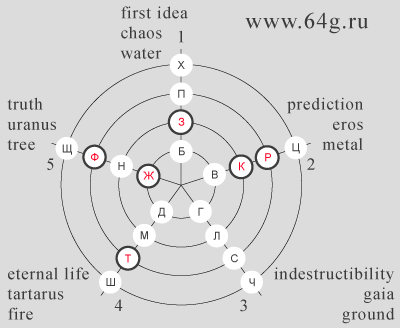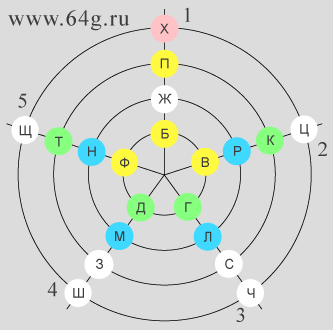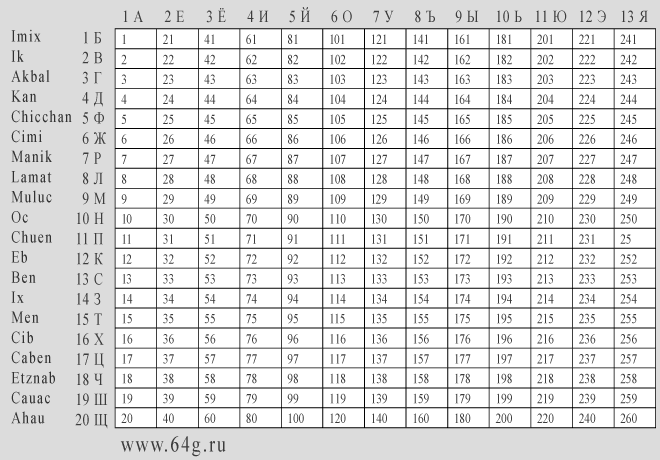-
-
Letters of contemporary Russian alphabet can be correlated not only to
astronomical cycles of the moon, but also with 20-day and 13-day periods of the
chronological cycle Tzolkin of ancient calendar of civilization Maya. Because in
the Russian alphabet there are 20 consonants and 13 vowel letters, if É (brief
È) and Ú Ü (firm and soft marks) to consider among vowels, that is
justified as in essence these alphabetic symbols designate speech sounds which
are unpronounceable variants of phoneme È.
Twenty consonant letters are comparable with circular numerological matrix of
senary scale of mathematical notation, that is shown on charts.


The shown circular matrix has four circles and five numerical axes, that is
necessary for 20 consonants of Russian alphabet.
Spatial positions of letters in the left scheme correspond to alphabetic sequence.
Spatial position of letters in the right scheme have structural or systematic
order which forms symmetric geometrical figures concerning first numerical axis,
and which is caused by correlations of phonetic parameters.
White color - letters Æ Ø Ù Ö × Ç Ñ.
Yellow color - letters Á Ï Â Ô.
Green color - letters Ã Ê and Ä Ò.
Blue color - letters Í Ì and Ð Ë.
Letter Õ designates a sound of breath and consequently is connected by phonetic
correlations with all alphabetic characters. Because all symbols of alphabet
designate sounds which are derivatives of breath.
Letters Ô Ç Æ Ò Ð Ê in the left scheme
are noted by red font. Spatial positions of these letters are changed in the
right scheme, and locations of other alphabetic characters are not changed.
Namely positions of six letters Ô Ç Æ Ò Ð Ê
are changed as a result of systematic arrangement in the right scheme, and other
alphabetic symbols are on stable places.
In the same way it is possible to compare 20 consonants of Latin alphabet
with circular matrix of numbers or numerical signs of senary numerology. But it
is necessary to consider that Latin letters have ambiguous phonetic values in
different West-European languages, and consequently structural or systematic
positions of alphabetic symbols can be different.
Senary system of mathematical notation was a basis of mathematics and calendar
calculations of civilization Maya. Namely it is possible to tell that Mayan
Indians designated numbers by pictographic signs which can be correlated to
numerical axes of the shown circular matrix. And also pictographic signs of
mathematical numbers of ancient China and Egypt can be correlated to five
numerical axes of circular matrix of senary numerology.
In essence five numbers are equivalent to five elements of Chinese philosophy
and primary potentialities of universe in the Greek mythology, and also with
aeons of divine Pronoia in the context of Gnostic Christianity.
1 axis - water - Chaos (unstable matter) - first idea or forethought.
2 axis - metal - Eros (creation of material shapes) - prediction or foreknowledge.
3 axis - ground - Gaia (stable material shapes) - indestructibility.
4 axis - fire - Tartarus (destruction of material shapes) - eternal life.
5 axis - tree - Uranus (transformation of physical matter) - truth.
Five aeons of divine Pronoia coincide with primary potentialities of universe in
the Greek mythology, but aeons have other esoteric values or mystical meanings
at fourth and fifth numerical axes of circular numerological matrix.
First idea is a reflection of divine spirit in waters of chaos.
Prediction is a prototype or plan of universe which has been displayed in
waters of chaos.
Indestructibility is realization of universe and human being.
Eternal life is an eternity and immortality of human beings, that differs
from destruction of material shapes and death in the context of Greek mythology.
Truth is a similarity of human being with the God, that too differs from
transformation of physical matter and regeneration of people as new alive
essences, or else to tell it differs from infinite alternation of lives and
deaths or reincarnations in the context of Greek mythology, or in a context of
Hindu philosophy.
Look more detail information on five elements of Chinese philosophy and
primary potentialities of universe in Greek myths, and also about aeons of
divine Pronoia on pages of other website
www.dominoopen.64g.ru/en.htm in section which has the name as
megaquadradominoes.
Or on pages of websites www.emotions.64g.ru
and www.numeralgame.64g.ru/en.htm.
Five axes in circular numerological matrixe of numbers of senary scale of
mathematical notation allow to correlate letters of Russian alphabet, and also
elements of Chinese philosophy and primary potentialities of universe or world
reality of Greek myths with Tzolkin chronological cycle in the calendar of Maya.
The word Tzolkin means "sacred calculation of days".
Chronological structure of Tzolkin is formed by 13 oshlahuntikus or periods
which have duration of 20 days or tonals.
In total the chronological cycle Tzolkin in calendar of Maya has size 20x13=260
days or kins as shown in the table.

-
The sequence of consonant characters of Russian alphabet in the table
corresponds to the systematic or structured order within the circular matrix of
numbers of senary numerology.
The sequence of vowels corresponds to the alphabetic order, but characters Þ and
Ý have other positions rather than in Russian alphabet, that is necessary for
symmetry which is shown on pages of this
website in section: metalinguistics.
Consonant letters correspond with tonals and als horizontals of the table.
Vowel letters correspond with oshlahuntikus and verticals
of the table.
For example, 70th day or kin in the Tzolkin chronological cycle in calendar of
Maya corresponds with tenth tonal and fourth oshlahuntikus, that corresponds with two
alphabetic letters, namely consonant Í and vowel È.
Interrelations of the Tzolkin cycle with contemporary Gregorian calendar in
different sources of information are different, and consequently I cannot
specify as correct any concrete dates. But according to one of variants the
present cycle of Tzolkin proceeds from 12/25/2008 to 9/10/2009, and following
will proceed from 9/11/2009 to 5/28/2010.
Pay attention that calendar date of May, 28th, 2010 coincides with
astronomical cycle of the planet Uranus and eras or
celestial charts of ages
in development of human civilization, that is described on pages of other
website: emotions.64g.ru.
Number of days in the cycle of Tzolkin can be interrelated with astronomical rotation of the planet Mars around
the Sun, that makes 780 days,
as 780/3=260.
Characteristics and mystical meanings of days or kins, also oshlahuntikus and tonals in the
Tzolkin chronological cycle are unknown.
Tonals have pictographic designations and names.
Oshlahuntikus are designated by numbers and have no names.
Oshlahuntikus in myths of Maya are deities which correspond to 13 layers of the
top world and resist gods of 9 layers of the bottom world.
Ratio with vowel and consonant characters of Russian alphabet, also with hierarchical pantheon of
gods in Vedic mythology can be considered as esoteric information which allow to
understand characteristics and mystical meanings which could exist in the
ancient Mayan culture.
TWENTY TONALS.
01 ![]() Imix - PUSHAN - Á.
Imix - PUSHAN - Á.
02 ![]() Ik - PRATYUSHA - Â.
Ik - PRATYUSHA - Â.
03 ![]() Akbal - USHAS - Ã.
Akbal - USHAS - Ã.
04 ![]() Kan - VISHNU - Ä.
Kan - VISHNU - Ä.
05 ![]() Chicchan
- CHANDRA - Ô.
Chicchan
- CHANDRA - Ô.
06 ![]() Cimi - DHARA - Æ.
Cimi - DHARA - Æ.
07 ![]() Manik - ARYAMAN - Ð.
Manik - ARYAMAN - Ð.
08 ![]() Lamat - BHAGA - Ë.
Lamat - BHAGA - Ë.
09 ![]() Muluc - MITRA - Ì.
Muluc - MITRA - Ì.
10 ![]() Oc - SAVITR - Í.
Oc - SAVITR - Í.
11 ![]() Chuen - ANSA - Ï.
Chuen - ANSA - Ï.
12 ![]() Eb - VARUNA - Ê.
Eb - VARUNA - Ê.
13 ![]() Ben - APA - Ñ.
Ben - APA - Ñ.
14 ![]() Ix - PAVAKA or ANALA - Ç.
Ix - PAVAKA or ANALA - Ç.
15 ![]() Men - DHATR - Ò.
Men - DHATR - Ò.
16 ![]() Cib - DHRUVA - Õ.
Cib - DHRUVA - Õ.
17 ![]() Caben - VIVASVAT - Ö.
Caben - VIVASVAT - Ö.
18 ![]() Etznab - SURYA - ×.
Etznab - SURYA - ×.
19 ![]() Cauac - ANILA - Ø.
Cauac - ANILA - Ø.
20 ![]() Ahau - PRABHASA - Ù.
Ahau - PRABHASA - Ù.
THIRTEEN OSHLAHUNTIKUS.
01 ![]() À - RUDRA.
À - RUDRA.
02 ![]() Å - ADJA ECAPAD.
Å - ADJA ECAPAD.
03 ![]() ¨ - AHY BUDHNYA.
¨ - AHY BUDHNYA.
04 ![]() È - VATA.
È - VATA.
05 ![]() É - INDRA.
É - INDRA.
06 ![]() Î - APAS.
Î - APAS.
07 ![]() Ó - PARJANYA.
Ó - PARJANYA.
08 ![]() Ú
firm mark - one cosmic twin of Ashvins.
Ú
firm mark - one cosmic twin of Ashvins.
09 ![]() Û - VAYU.
Û - VAYU.
10 ![]() Ü soft mark - one
cosmic twin of Ashvins.
Ü soft mark - one
cosmic twin of Ashvins.
11 ![]() Þ - APAM NAPAT.
Þ - APAM NAPAT.
12 ![]() Ý - MATARISHVAN.
Ý - MATARISHVAN.
13 ![]() ß - TRITA APTYA.
ß - TRITA APTYA.
Look detail information about ratio of Vedic mythological gods with letters of Russian alphabet on pages of this website in other section: names of gods.
Following page results information about Haab cycle in the calendar Maya, and also about numerical sign systems of the Phaistos Disc and the Ring from Mavro Spelaio, namely data on numerology and pictograms of ancient civilizations.
And also nine pages in this part of website allow to find information about numerical signs of duodecimal numerology and names or denominations of letters, philosophical values and mystical senses of Etruscan and Phoenician writings, symmetric spatial figure of magic star and lunar mansions in contemporary astrology, pictograms and navigation of Argonauts for Golden Fleece.